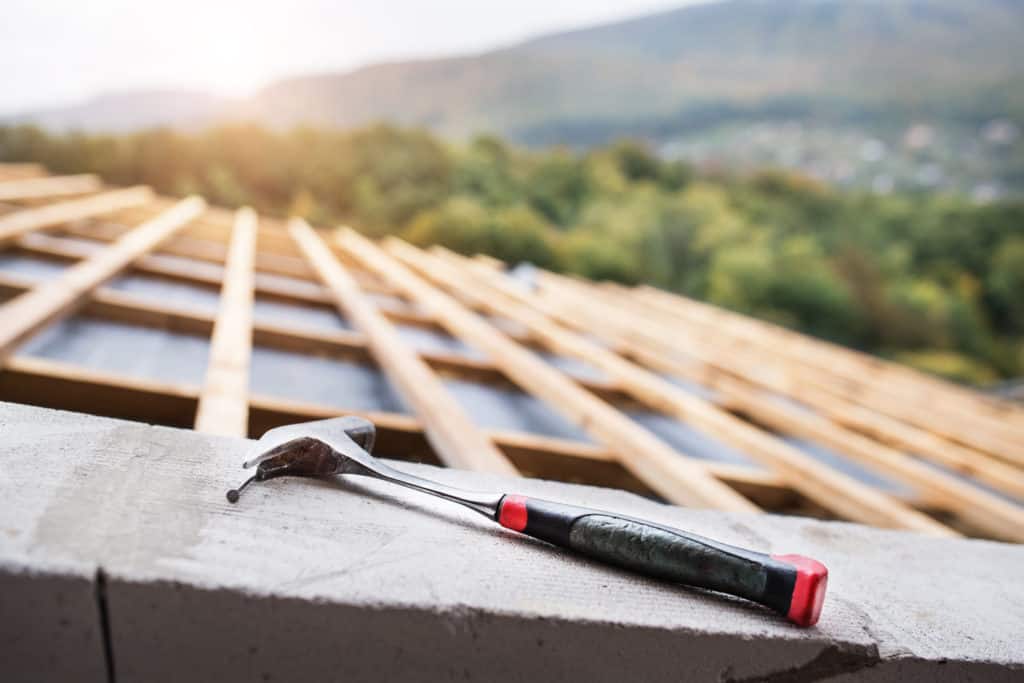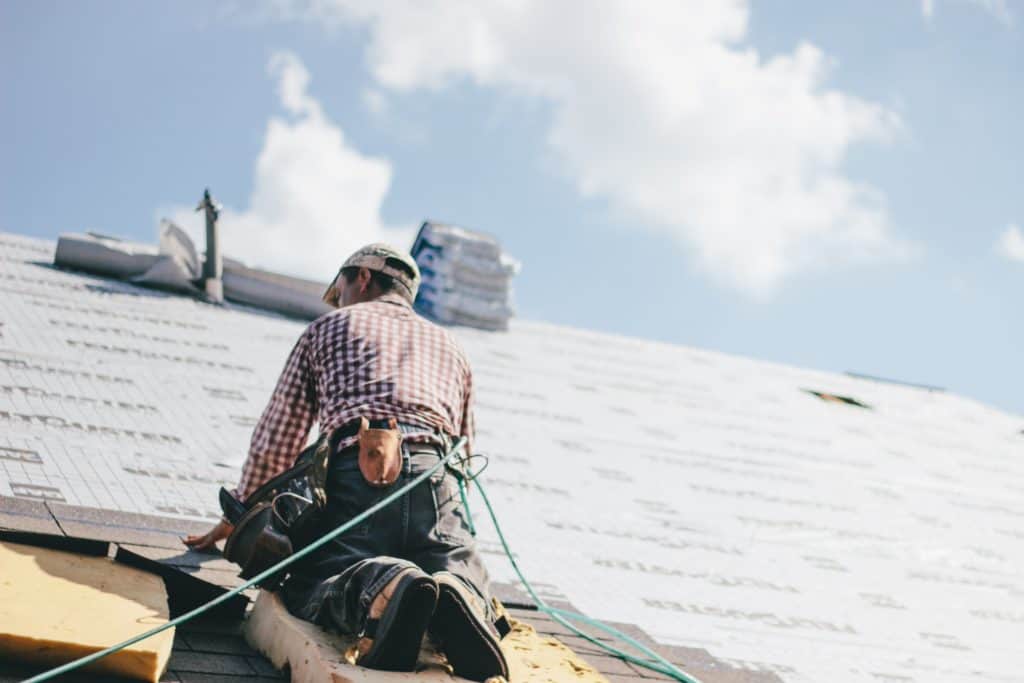What does a roofer do? This article explains what a roofer does and what training they need to succeed. It also discusses the job outlook. The role of a roofer can be advantageous, but it can also be challenging at the start.

Job Duties
Roofers are responsible for repairs and maintenance on all types of roofing systems. This involves measuring roof areas, calculating materials, and installing new shingles, insulation, and vapor barriers. They use power and hand tools, including ladders and scaffolding, to access the roof as needed. In addition to repairs, they also perform routine maintenance duties, such as cleaning and inspecting roofs regularly.
Roofing is a demanding profession; roofers must be physically fit and skilled to do it well. They must be able to use hand tools and stand on ladders for long periods. They should also have experience using different roofing materials. These professionals should have an upbeat personality and the ability to work safely at heights for long periods.
Roofers also perform other duties, such as site set-up and clean-up. They must be able to set up scaffolding, ladders, and other temporary structures to help them do their job safely. They must also know how to properly clean the work area and ensure that all the necessary materials and tools are available.
Roofing workers must have skills in preventing accidents, which is critical to their job. Roofers must be able to use personal protective equipment and safety equipment. They should wear a hard hat and boots and follow OSHA safety regulations. They must also be able to climb ladders safely and use flash heat welding to ensure no leaks occur during installation.
A roofer has many other responsibilities, including repairing and building new roofs. They must be able to install materials safely, set up warning lines, and use hand and power tools. They must also be able to work on high ladders for long periods. In addition, they must have excellent attention to detail and organizational skills.
Those interested in becoming a roofer should consider going to college. Although there are no formal educational requirements for roofing, attending trade school and receiving additional education will help you stand out from the competition. Alternatively, you may consider completing an apprenticeship. However, there are also a variety of other routes to becoming a roofer.
As a roofer, you must be able to choose suitable materials for the job. Roofing materials are typically wood or asphalt.
Job growth for roofers is moderate, with only about fifteen thousand new jobs expected each year over the next decade. These openings will result from workers retiring, leaving the workforce, or transferring to another occupation. However, this occupation is less vulnerable to downturns than other construction trades. Since most of the roofing work is repair and reroofing, demand for roofers is less affected than other construction workers. However, some downturns do occur, and workers may experience periods of unemployment.

Training requirements
A roofer, also known as a roof mechanic or roofing contractor, is a tradesperson who specializes in roof construction. They install, repair, and replace roofs with different types of materials. This trade can be a lucrative career option if you love working on roofs. But there are specific training requirements that you must meet before you can become a roofer.
The most common training requirement for roofers is a three-year apprenticeship. This program combines classroom and on-the-job training. Apprentices receive at least two thousand hours of paid training annually. They also receive instruction in basic math and safety procedures. In addition to classroom instruction, roofing apprentices are trained to use tools properly.
Another training requirement for roofers is an understanding of construction codes and safety. Roofing professionals must be skilled in implementing safety standards, buying the appropriate materials, and supervising others. They also must be diligent and be able to communicate effectively with other people. Finally, many roofers must meet a project’s deadline, so understanding time management skills are very important.
Another requirement for roofers is completing a Work Safely at Heights course. It is also mandatory for all construction workers to obtain a Construction Induction Card. Roofing workers must also learn how to apply cement mortar to a roof’s ridge and edge tiles. In addition, they must know how to cut and size roofing materials and overlap successive layers of tiles to ensure a secure and safe installation.
Besides training, roofers must possess good physical condition and balance. Employers often prefer applicants who have a high school education. While high school education is not mandatory, it is beneficial. Several trade schools offer roofing training courses; most programs last nine months. This training course can lead to an apprentice, supervisor, or contractor career.
As an apprentice, a roofer learns through hands-on experience on a roof while also taking classes. Most apprenticeships are with pay, so this can be a great way to earn money while going to school. You can pursue an Associate’s degree program if you’d like to earn more money. An Associate’s degree in construction can be completed in two years. It involves the same classes and hands-on experience, but you won’t get the one-on-one time with the Foreman.
The best way to learn how to become a roofer is to go to school or get an apprenticeship. Most roofing jobs require at least an Associate’s degree, and you can pursue one from community colleges or specialized trade schools. A two-year program can prepare you to join the workforce. You’ll also learn how to erect scaffolds and hoists properly.
Regardless of what type of roofing job you want, knowing how to protect your family and your property is essential. There are many safety requirements for roofers. Using fall protection equipment is an essential piece of safety equipment. You should also know how to work safely with a temporary guardrail. These rails have engineered base plates installed, so your workers stay on the right side.

Career Outlook
As the demand for new roofs continues to rise, the career outlook of a roofer is positive. The construction industry is expected to grow 7% through 2026, and roofer jobs should grow much faster. The demand for roofers is also less likely to be affected by economic conditions than for other construction workers.
Careers in roofing are often advantageous. These professionals work under challenging conditions in all kinds of weather. Not only do they perform physically demanding tasks, but they also ensure the safety of buildings and people. This is an advantageous field that offers high pay, benefits, and job security. However, some people find the work too repetitive, so they might want to consider a different career path.
Although there are no formal requirements for being a roofer, many employers would prefer to hire a qualified, experienced person at least 18 years old. They would also prefer someone with a robust physical condition and good balance. High school education is not a prerequisite but usually a benefit. Some schools offer courses to help students gain skills necessary for roofing. Courses in basic math and mechanical drawing are also helpful.
Once you’ve completed your roofing education, you may want to look for an apprenticeship. Contact local contractors or the United Union of Roofers for information. You can also try your luck with newspaper classified ads. Some vocational schools have placement offices where you can find information about finding an apprenticeship. The state employment service and school placement offices can also be beneficial.
As a roofer, you’ll cover structures with roofing and spraying materials that help seal, insulate, and soundproof them. The job also requires some experience working with the public. As of 2020, the number of people working in the roofing industry will increase by 5% or about 15,600 people.



